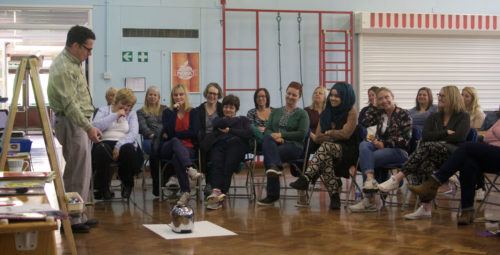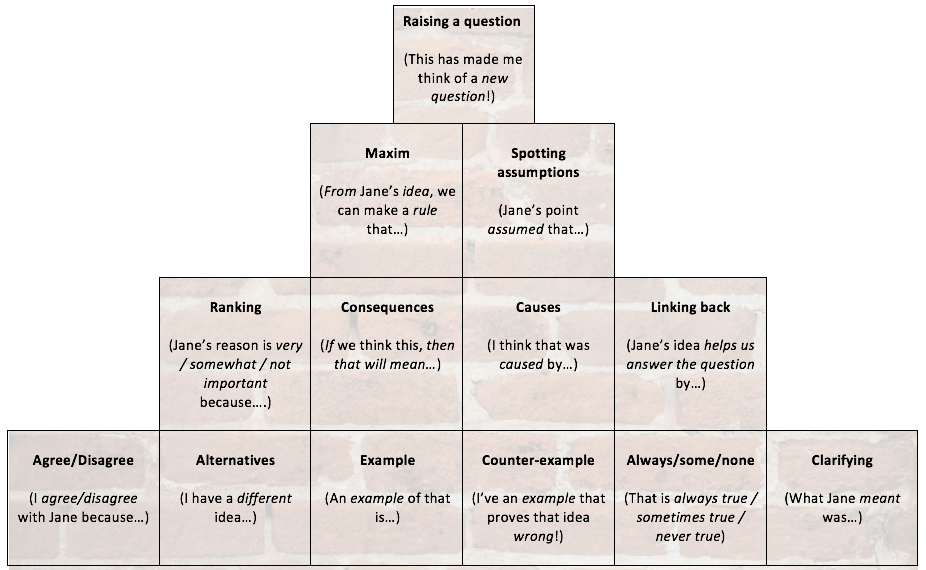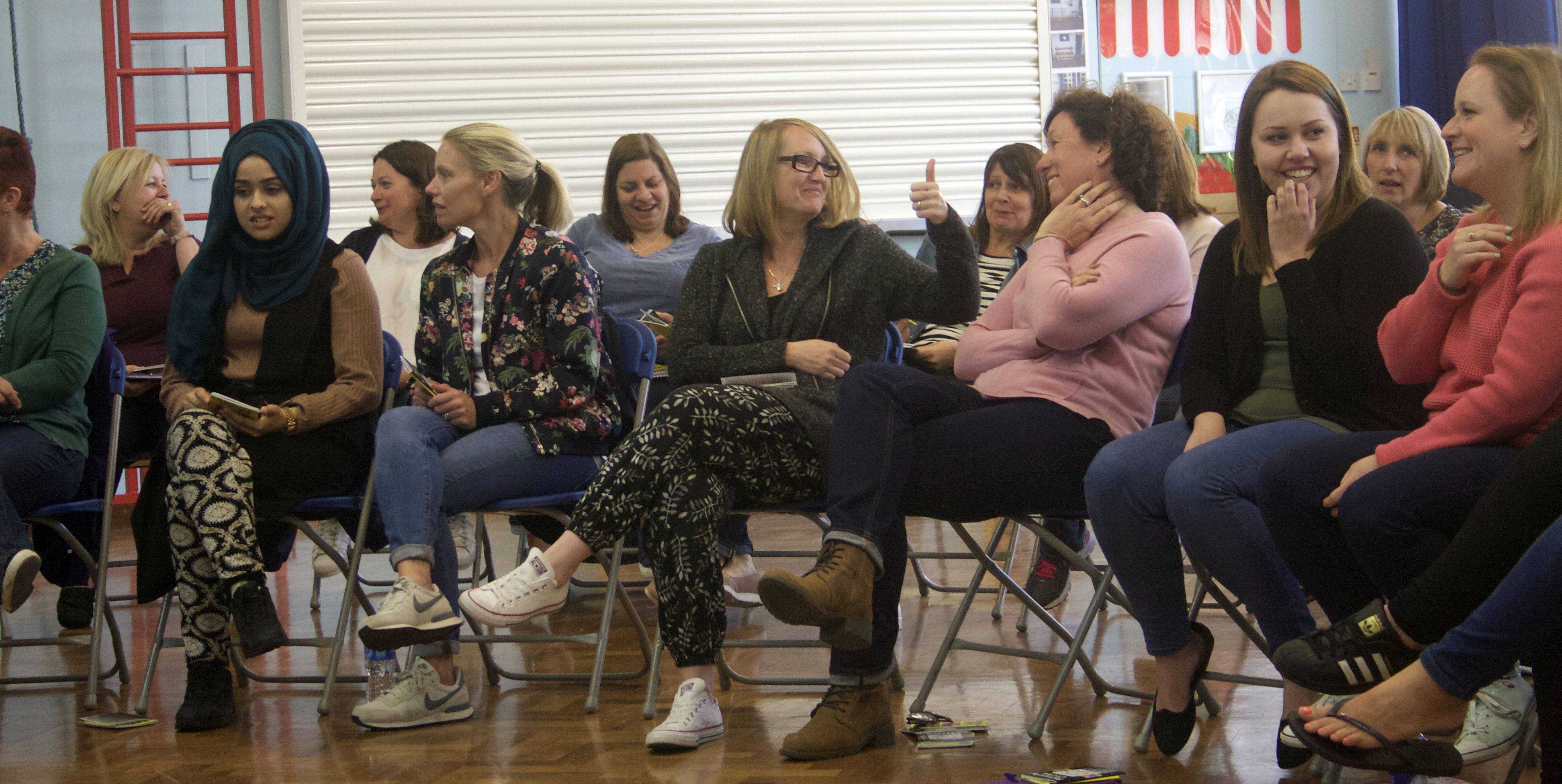Do you want to increase the impact of P4C at your school?

Your staff have completed their Level 1 training pupils are engaging with philosophical questions, and giving reasons for their opinions owning more of the discussion as the teacher takes a back seat. However, you know you are only scratching the surface of what P4C can offer your school. You’ve taken the first steps on a journey to a philosophical school. So what’s next?
Philosophy Circles Level 2: The Philosophical Teacher
This INSET will will help staff build on their Level 1 training by developing facilitation skills and planning for progress. A special focus is placed on the ‘Take a Back Seat’ principle:
- How can we make our facilitation most effective?
- How can we do less to help our pupils do more?
- How we can help pupils assess themselves?

Develop teachers’ facilitation
Pupils’ thinking can be vastly improved by small changes in our choice of words
- How to promote philosophical vocabulary in pupils as young as Reception
- How to use ‘Weightless Facilitation’ to push for deeper thinking
- How to to avoid using language that ‘pulls the shutters down’
- Tried-and-tested classroom management techniques that don’t make pupils clam-up
- How ‘putting into question’ can be more effective than ‘asking a question’
Children think best when a question is ‘physicalised’
- How to spot questions and opinions that can be ‘physicalised’
- How to ‘physicalise’ to avoid over-loading their working memory
- How to use ‘Philosophy in Role’ to dramatise a question
- How to organise pupils’ seating by their opinions

Activities that promote philosophical thinking moves
In Level 1, we focussed on Community Builders that promote the social, emotional and behavioural habits needed for philosophical enquiry. In Level, we explore how Community Builders can be used to develop pupils’ academic moves. We call these EMMAs – Essential Move-Making Activities:
- Ranking Reasons
- Socrates 5-Steps
- Dissecting Monty Python’s ‘Argument Clinic’
- Performing their own ‘Argument Clinic’ scenes
- The Always, Some, None Game
- Spot The Assumption!
It has been fascinating to watch the children engage with a range of challenging topics with maturity, enthusiasm and empathy thanks to the facilitation provided by Tom. Their curiosity was inspired by the thought-provoking stimuli in each session and several individuals, who usually find it challenging to share their ideas, came to the fore during the big discussions.
Pupils comment that they are thoroughly enjoying P4C and enthusiastically anticipate their lessons with Tom each week; they also site that ‘they enjoy the challenges to their thinking.’
Since commencing P4C, we have noticed a dramatic increase in the children’s ability to discuss concepts with their peers and they have vastly improved in their ability in looking at one another when speaking, in actively listening to one another and in building upon and challenging others’ views and opinions. Before the lessons started, the children were not listening deeply to one another and responding to one another constructively – they had their opinion and that was it. We have also noticed an increase in confidence and concentration.
Initially, the children tended to direct their responses towards the adult. After a couple of weeks however, they were looking at the child they were responding to and dialogue bounced around the room without adult intervention.
The children’s critical reasoning skills were also developed; children were starting to support their views with reasons.
Enquiry based methods are also being instigated by the pupils themselves in other curriculum areas:
- Who is the villain in Macbeth?
- Who is responsible for King Duncan’s death?
- Was the Highwayman guilty of any crime?
- Is jealousy an acceptable motive for murder?
- Can murder ever be justified?
As teachers, we are excited about working elements of P4C into our day-to-day classroom practice, particularly when creating and discussing questions during class reading sessions.
Shareen Johnson and Jonathan Hall, Amesbury Primary School
After an inspiring and informative Inset Day, led by Tom, all staff were eager to try out P4C strategies and felt strongly about the principles P4C promoted.
P4C has enabled children to voice their opinions in a calm and controlled manner whilst having their views challenged. It has provided them with time to critically think about their own morals, beliefs and thoughts.
We invited Tom back for Interfaith Day! Through P4C, children naturally made comparisons and built upon their RE knowledge. Children thoroughly enjoyed the current and interactive assemblies, pitched appropriately for each Key Stage.
The weekly bulletins inspire and instigate current discussions with the children which can occur in many curriculum areas. The mini resource booklets are great too as they are concise and clear. The resources are practical, effective and require very little preparation- which is great!
Though we have separate P4C sessions, we have easily and seamlessly begun to use it in other curriculum areas.
Just fantastic!
Kayleigh Dell
Greenway Primary School
Once again, many thanks for an inspiring and encouraging workshop at Harmondsworth School. Personally, I found it useful to build on a shorter workshop ,which I experienced about 3 years ago, but also to see how it can be used in mainstream settings such as ours, as well as with higher achievers .
David Beeston
Teacher, Harmondsworth School
It was great to meet you and work with you today; I thoroughly enjoyed it; I found it engaging and thought provoking. It was super that we had so many opportunities to try out the activities/games etc. The ‘hot off the press’ booklets are such a good idea; I will certainly be reading through mine over the weekend as I intend to try out a game or two with my class next week
Ali Few
Deputy Headteacher, Broomfield School
‘Very active, good clear explanations and stimulating! I’ll use it with my child too, not just in class’
Elena Rodolfi
‘Clear examples of how the program should run. Very practical, hands-on, nice facilitator!’
Isabella Giraldi
‘A great course for anyone needing a new approach to teaching and questioning. It really opens the mind to further possibilities’ –
Jade Jones
‘A thought provoking, worthwhile day!’
Maragret O’Connor
‘Educational, eye-opener, practical and fun. It was practical so I had an opportunity to experience how children would benefit from this activity’ Wema Mwendamseke
‘A great workshop, interactive, filled discussions and stimulating’ –
Siddique Miah
‘Well planned workshop, very interactive and fun. Can be applied to almost all age groups.’
Jane Sparrow
Teaching Staff
Morningside Primary School, Hackney
Engaging, pacy, well-presented and (Tom was) knowledgable. Lots of practical ideas and links to use in lessons. Great delivery, kept us engaged all day.
Adam Dlugoszewski, Whitehouse Primary School
Made enjoyable and memorable by actually taking part in the community tasks. Lots of participation which gives clear examples of how to deliver to children. Opportunities to think and plan for our own year groups. Tom delivered the course exceptionally well – clear and fun!
Delphine Gunn, Tickford Park Primary School
Confident, fluid and entertaining. A very interactive, hands-on and practical. I particularly liked planning sessions within the course.
Caroline Prudence, Two Mile Ash School
A good balance between presenting and lots of practical activities which enabled demonstrations of key concepts. I look forward to starting back in school!
Lucy Eldridge, Two Mile Ash School
Teachers
Milton Keynes Teaching School Alliance
Brilliant! Tom was gentle and inclusive and allowed us all to contribute. Just great! Come and deliver a session in school!
Cathy Kelly, St Thomas Aquinas School
Lots of practical ideas and activities that can be used easily in school. These can easily be adapted to the curriculum already being taught. Tom was very knowledgable and able to adapt ideas and direction of course to answer individual questions.
Karen Bridges, Deputy Headteacher, Green Park School
Tom was very engaging and had a good mix of practical and theory. A thoroughly engaging course with practical elements you can use in the classroom the next day.
Tom Ruffett, Two Mile Ash School
Fantastic training where all staff were highly engaged and are now ready to start the P4C strategies at school. Very well organised, fun for all and lots of ideas to use immediately.
Andrea Wadsworth
Crosslee Primary School, Manchester
‘An excellent way to develop critical thinking and confidence’
Jill Wright
‘An extremely useful session – children need to be critical thinkers’
Sarah Smith
‘Really thought provoking and interesting’
Hannah Thompson
‘A fabulous day that has inspired me to reflect upon everything;
Sophie Rigby
‘Excellent day, very useful, really enjoyed this lesson’Carmaleta Henshaw
Carmaleta Henshaw
‘All very relevant and easy to relate to. A creative way to engage adults and encourage / inspire them to plan differently. Clear progression from Year 1-6’
Sophie Hadwin
‘Great examples given to enable children to become critical thinkers’
Claudia Cotton
Teachers at Whitefield Primary School
I just wanted to drop you a message to say thank you so much for such a fab session on Tuesday. I thought it was informative, relevant and full of very useable practical ideas which will definitely be used in my year two classroom.
Thank you once again.
Sophie Vellacott
Year 2 Teacher, London
‘This was a very active, informative session and has provoked a lot of ideas about how I can implement it in my classroom.’
‘Outstanding presentation.’
‘Great facilitator with lots of energy!’
‘Fab! Lots of hints and tips and great interactive demonstrations. I now feel confident to have a go at implementing in a science lesson.’
‘Absolutely excellent, thank you!”Really brilliant – has given me lots of ideas. Am excited anboit applying these in my classroom.’
Teachers
Lomdon Teachfirst Conference 2016
‘Best INSET ever. Fantastically resourced, well paced and great learning.’
‘Got us all thinking. Lots of brilliant ideas to use in the classroom. Really interactive.’
‘I am going to take up Philosophy! Very thought provoking!’
‘Activities are challenging to the thought process. I intend to use all of them in my teaching.’
‘Excellent ideas to encourage children to think and debate. Also to question their opinions in a safe environment.’
‘Great pace and presentation.’
Teaching Staff
Greenway Primary School
Assess and promote progress
P4C and assessment have a tricky relationship. How can we assess, record and demonstrate pupil progress without killing the fun?
Simple tools for everyday assessment
- Using Self- and Group-Assessment surveys
- How to use the ‘Fishbowl’ method for peer-assessment
- Build a ‘Philosophical Wall’ before asking pupils to know it down
- Using Spot and Stripe as WAGOLLS (What A Good One Looks Lik)
Applying strategies to foster an academic atmosphere
- Why ‘No Right or Wrong answer’ can be harmful
- How to gently banish ‘No Right and Wrong’ without affecting confidence
Long-term approaches to Assessment for Learning
- How to make the most of video recording
- Using P4C to help them write play-scripts, essays and stories
- How being less like a philosophy student can make you a better philosopher
Click here to edit Spacer module.
Click here to edit Spacer module.

This all sounds great, but what will OFSTED say?
With the relentless focus on data, everything schools do has to show an impact on maths and literacy. Fortunately, not only does OFSTED look very favourably on Philosophy for Children, but a recent EEF study demonstrated that it had a positive impact on both maths and literacy scores. We are excited about philosophy for its own sake, but it’s nice to know that it has a benefit for measurable outcomes, and in particular that it helps to diminish the difference between disadvantaged children and their peers.
‘Philosophy for Children is giving pupils the skills they need to present a point of view and become more articulate, thus boosting their confidence
St Matthews School, Westminster
“Impressively, year 2 pupils can identify ethical dilemmas in their fiction books and propose related questions for discussion in philosophy lessons”
“Philosophy lessons challenge pupils to respond to probing questions, such as, “Are all humans connected in some way?”
Churchfields Infant School, South Woodford
The school advises and supports other schools in the use of philosophy with children. This exemplary practice is spreading throughout the school and is having a positive impact on pupils ‘communication and thinking skills and this is beginning to be reflected in their achievement. In an excellent philosophy lesson in the nursery children were challenged to think about the characteristics of two imaginary characters and whether they would change depending on their facial expressions or on what they wear. The curriculum is broad and balanced and meets pupils’ needs well, including the excellent promotion of their spiritual, moral, social and cultural development and philosophy.
SparHawk Infant and Nursery School, Norfolk
In a year 5 and 6 philosophy lesson, excellent use was made of a recently released Christmas advertisement for a famous store to encourage pupils to identify sophisticated concepts such as reliability, hope, trust and friendliness. This work made a particularly good contribution to developing their social and moral awareness
North Lakes School, Penrith
‘The thought provoking and exciting curriculum the school has developed over the last two years is an outstanding component of the school’s success (this includes) the development of ‘Philosophy for Children’, a powerful tool which both excites the pupils and gives them the confidence to explore stimulating and challenging ideas and concepts. It not only strengthens their academic learning, but also encourages their empathy for others and gives them insights into the adult world
Ropsley Primary School
What do you get on our courses?
Philosophy for Children is recognized for raising attainment and well-being, but like any approach, it can easily fizzle out after initial enthusiasm. Here’s why hundreds of schools choose us to foster their long-term success:
Resources that integrate P4C into your existing curriculum
Trainers who still work with children
Post-Course Email Support
A Clear, flexible structure
Lively, practical, memorable training
Resources for ALL ages
“All the positive testimonials provided by other schools was certainly a winning factor for us. The training and workshops were simply outstanding.”
I inherited my role as P4C coordinator from my colleague who tasked me with planning a Philosophy Day. I had looked at several workshops and was pleased to stumble across The Philosophy Man website. All the positive testimonials provided by other schools was certainly a winning factor for us. The training and workshops were simply outstanding.
All the staff had basic P4C training but did not know how to use it within their classrooms. This then acted as a CPD opportunity for all staff and this was furthered in the staff meeting. There was a buzz during the staff meeting, which for any member of staff attending a staff meeting at the end of a half term, knows this is a rare thing! All the staff said how enthused and excited they felt to get back into their classrooms and try out the methods they had been shown.
After the workshops, I interviewed some children about their experience. I deliberately picked children who really struggle with the academic side of school life. One child, who had a workshop on bargaining for his life against a Mayan tribe, said “I loved the P4C workshop. It was so much fun to think of reasons why my life was valuable and the best part was, we didn’t have to do any work!”. The children saw the workshops as a chance to express themselves.
Thank you so much for inspiring us to continue with the exemplary training you provided and we look forward to working with you in the future!
Sarah Brown
Dulverton Primary School
“Several individuals, who usually find it challenging to share their ideas, came to the fore during the big discussions.”
“It has been fascinating to watch the children engage with a range of challenging topics with maturity, enthusiasm and empathy thanks to the facilitation provided by Tom. Their curiosity was inspired by the thought-provoking stimuli in each session and several individuals, who usually find it challenging to share their ideas, came to the fore during the big discussions.
Pupils comment that they are thoroughly enjoying P4C and enthusiastically anticipate their lessons with Tom each week; they also site that ‘they enjoy the challenges to their thinking.’
Since commencing P4C, we have noticed a dramatic increase in the children’s ability to discuss concepts with their peers and they have vastly improved in their ability in looking at one another when speaking, in actively listening to one another and in building upon and challenging others’ views and opinions. Before the lessons started, the children were not listening deeply to one another and responding to one another constructively – they had their opinion and that was it. We have also noticed an increase in confidence and concentration.
Initially, the children tended to direct their responses towards the adult. After a couple of weeks however, they were looking at the child they were responding to and dialogue bounced around the room without adult intervention
The children’s critical reasoning skills were also developed; children were starting to support their views with reasons.
Enquiry based methods are also being instigated by the pupils themselves in other curriculum areas:
Who is the villain in Macbeth?
Who is responsible for King Duncan’s death?
Was the Highwayman guilty of any crime?
Is jealousy an acceptable motive for murder?
Can murder ever be justified?
As teachers, we are excited about working elements of P4C into our day-to-day classroom practice, particularly when creating and discussing questions during class reading sessions.”
Shareen Johnson
Amesbury Primary School
“The resources are practical, effective and require very little preparation- which is great!”
After an inspiring and informative Inset Day, led by Tom, all staff were eager to try out P4C strategies and felt strongly about the principles P4C promoted.
P4C has enabled children to voice their opinions in a calm and controlled manner whilst having their views challenged. It has provided them with time to critically think about their own morals, beliefs and thoughts.
We invited Tom back for Interfaith Day! Through P4C, children naturally made comparisons and built upon their RE knowledge. Children thoroughly enjoyed the current and interactive assemblies, pitched appropriately for each Key Stage.
The weekly bulletins inspire and instigate current discussions with the children which can occur in many curriculum areas. The mini resource booklets are great too as they are concise and clear. The resources are practical, effective and require very little preparation- which is great!
Though we have separate P4C sessions, we have easily and seamlessly begun to use it in other curriculum areas.
Just fantastic!
Kayleigh Dell
Greenway Primary School
“We have been struggling to find stimuli/resources which ‘fit’ our units.”
Now, with your demonstration of ‘backwards planning’, we can ‘personalise’ our units whilst practising our thinking skills at the same time.
I thought you might also like to know how these sessions have spilt over into other areas of study. Talking about the second world war, and watching the Book Thief in particular, gave rise to a prolonged discussion (over two days) about how we should act and how we might really have acted in those circumstances it was quite fascinating to listen to them and hear the questions that they asked of themselves.
The final stage – ensuring all the thinking skills are being taught – puts all the pieces of the puzzle together.
Margaret
Teacher
Who’s running your course?
About Jason Buckley
The Founder and Director of The Philosophy Man. A life-long philosopher and former teacher, English, Jason is now an internationally renowned trainer, writer and speaker on P4C, classroom dialogue and stretching the more-able. He is author of two books, with more in the pipeline. He is also an outdoor educator, storyteller and improviser, and all these skills come together in his lively training, with minimum of Death by PowerPoint.
Click here to find out more about Jason Buckley →
About Tom Bigglestone
Tom’s courses are incredibly well-received thanks to his several years’ teaching experience. He has been Head of Department at both primary and secondary level, and in both the maintained and private sector. He has specialised for several years in P4C, and in 2014 was awarded The Walter Hines Page scholarship, for which he spent time in the United States researching assessment of philosophical skills. He brings his vast classroom experience and know-how into his energetic and interactive training.
Click here to find out more about Tom Bigglestone →
Click here to edit Spacer module.
What will the training look like?
To complete Philosophy Circles Level 2, you can either:
Book 2 days of INSET – these do not have to be consecutive
OR
Book 1 day of INSET + 1 day of observed pupil workshops with twilight INSET.
How much does the course cost?
Everything we deliver is tailored to your school, and so it can be the same with the price if you are unusually small / large. However, most bookings for under 30 staff follow these prices:
| Peak INSETs Full day | Mon, Fri Full/half day | Tue – Thu Full/half day | School Packs | Teacher Packs |
|---|---|---|---|---|
| from £1250 | £1250 / 800 | £1000 / 700 | 1 included | 30 included |
Are you in a cluster or MAT?
Collaborate and reduce the costs of your INSET day. Two schools clustering, £750 each, or for three or more schools £600 per school.
r
If your budget means you can’t afford the above prices, but you can be flexible and arrange the pupil workshop day at short notice, ask to go on our list for stand-by days. When we are working in your area or have a quiet week, we will email you to offer a day at a discounted rate. Contact us using the form below to join the list.

Any questions?
If you have any questions, or would like to make a booking in person, please fill in this form. We’ll get back to you as quickly as we can.

